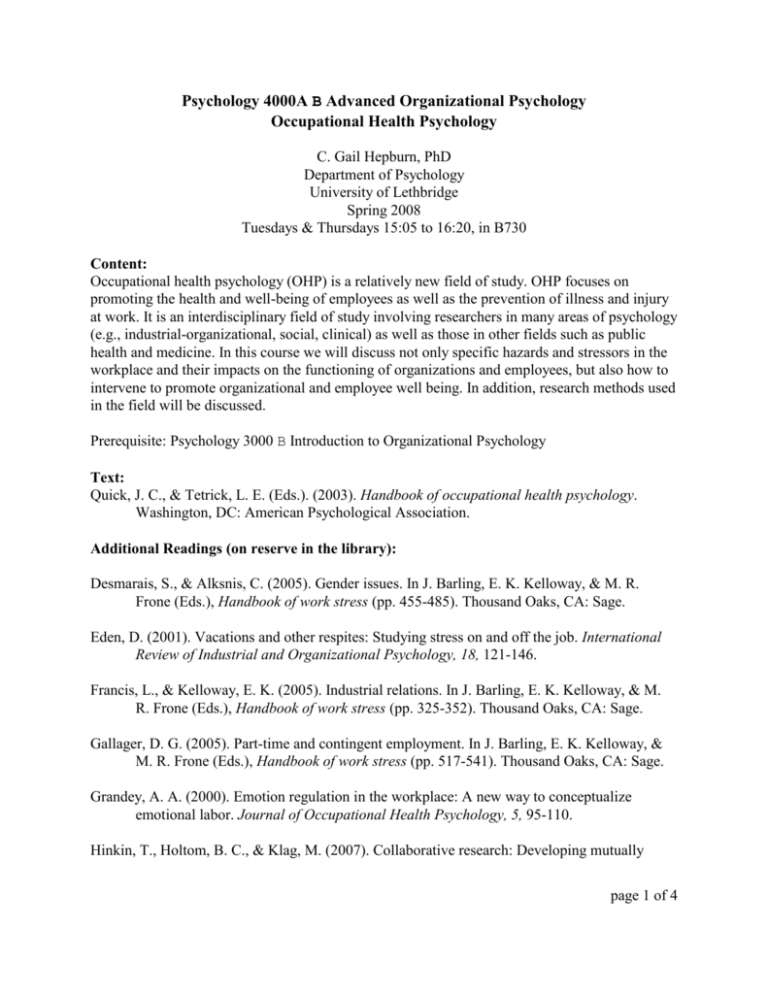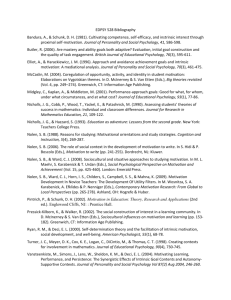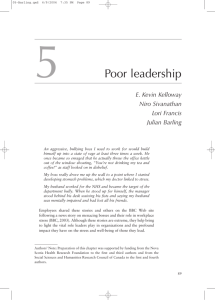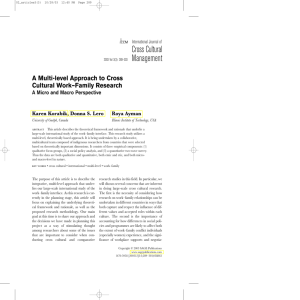Psychology 4000B B Advanced Organizational Psychology
advertisement

Psychology 4000A B Advanced Organizational Psychology Occupational Health Psychology C. Gail Hepburn, PhD Department of Psychology University of Lethbridge Spring 2008 Tuesdays & Thursdays 15:05 to 16:20, in B730 Content: Occupational health psychology (OHP) is a relatively new field of study. OHP focuses on promoting the health and well-being of employees as well as the prevention of illness and injury at work. It is an interdisciplinary field of study involving researchers in many areas of psychology (e.g., industrial-organizational, social, clinical) as well as those in other fields such as public health and medicine. In this course we will discuss not only specific hazards and stressors in the workplace and their impacts on the functioning of organizations and employees, but also how to intervene to promote organizational and employee well being. In addition, research methods used in the field will be discussed. Prerequisite: Psychology 3000 B Introduction to Organizational Psychology Text: Quick, J. C., & Tetrick, L. E. (Eds.). (2003). Handbook of occupational health psychology. Washington, DC: American Psychological Association. Additional Readings (on reserve in the library): Desmarais, S., & Alksnis, C. (2005). Gender issues. In J. Barling, E. K. Kelloway, & M. R. Frone (Eds.), Handbook of work stress (pp. 455-485). Thousand Oaks, CA: Sage. Eden, D. (2001). Vacations and other respites: Studying stress on and off the job. International Review of Industrial and Organizational Psychology, 18, 121-146. Francis, L., & Kelloway, E. K. (2005). Industrial relations. In J. Barling, E. K. Kelloway, & M. R. Frone (Eds.), Handbook of work stress (pp. 325-352). Thousand Oaks, CA: Sage. Gallager, D. G. (2005). Part-time and contingent employment. In J. Barling, E. K. Kelloway, & M. R. Frone (Eds.), Handbook of work stress (pp. 517-541). Thousand Oaks, CA: Sage. Grandey, A. A. (2000). Emotion regulation in the workplace: A new way to conceptualize emotional labor. Journal of Occupational Health Psychology, 5, 95-110. Hinkin, T., Holtom, B. C., & Klag, M. (2007). Collaborative research: Developing mutually page1 of4 beneficial relationships between researchers and organizations. Organizational Dynamics, 36, 105-118. Hurrell, J. J., Jr. (2006). Critical incident stress debriefing and workplace violence. In E. K. Kelloway, J. Barling, & J. J. Hurrell Jr. (Eds.), Handbook of workplace violence (pp. 535548). Thousand Oaks, CA: Sage. Krause, N., & Lund, T. (2004). Returning to work after occupational injury. In J. Barling & M. R. Frone (Eds.), The psychology of workplace safety (pp. 265-295). Washington, DC: American Psychological Association. Liu, C., & Spector, P. E. (2005). International and cross-cultural issues. In J. Barling, E. K. Kelloway, & M. R. Frone (Eds.), Handbook of work stress (pp. 487-515). Thousand Oaks, CA: Sage. Loughlin, C., & Frone, M. R. (2004). Young workers’ occupational safety. In J. Barling & M. R. Frone (Eds.), The psychology of workplace safety (pp. 107-125). Washington, DC: American Psychological Association. McMillan, L. H. W., O’Driscoll, M. P., & Burke, R. J. (2003). Workaholism: A review of theory, research, and future directions. International Review of Industrial and Organizational Psychology, 18, 167-189. Rayner, C., & Keashly, L. (2005). Bullying at work: A perspective from Britain and North America. In S. Fox & P. E. Spector (Eds.), Counterproductive work behavior: Investigations of actors and targets (pp. 271-296). Structure: Required readings will provide the basic material for each topic to be covered. An additional empirical article will be assigned for most topics. Classes will be in seminar format with either the course instructor or student(s) responsible for delivering core material and generating discussion. A tentative topic schedule appears at the end of this outline. Evaluation: Grades will be based on four components: class presentation, class participation, a research paper, and a summary assignment. These four elements will assist students in developing their skills in presentation, critical analysis, and academic writing. Student Presentations (25%) Each student will participate in at least one class presentation. Each student will select a course topic and be responsible for the successful running of the class period on that topic. This will involve a presentation (approximately 15-20 minutes) and the generation of class discussion. Students must provide a one page handout on the topic for the class and provide, one week in page2 of4 advance, a recent and brief empirical article on the topic (i.e., within the last 5 years). Whenever possible, an electronic version of the empirical article should be provided. If more than one presentation is required the class will discuss how to allocate the 25% across presentations. Student Participation (20%) Attendance will contribute to 10% of the participation mark. To receive credit for attendance, those NOT presenting must bring a brief summary of the key points from the readings to class and indicate one question they would like to explore. To ensure proper credit is received, hard copies of the summary and question, labeled with the student=s name and student number, must be submitted to the course instructor. An additional 10% will be based on student contributions to regular class discussion. Students who do not contribute to the class discussion will receive a failing grade on this component. Paper (35%) Students will be asked to write an 8 to 10 page paper on an OHP topic of their choice due in class on March 20th. Topics MUST be approved by the course instructor by February 28th. Papers are required to be in APA format; a portion of the grade is allotted to APA style. Students should consult the Publication Manual of the American Psychological Association (5th edition). Summary Assignment (20%) A summary assignment will be due in class on the last day of class. Students will be asked to answer several questions that will allow them to demonstrate their understanding of the course material as well as their ability to apply the course material. Hard copies must be submitted and no handwritten assignments will be accepted. These questions will form the basis of the final class discussion. NOTE: If students are not able to complete an aspect of the course they must contact the instructor as soon as possible before the due date. Failure to notify the instructor prior to the due date will result in a mark of zero. Medical reasons must be supported by a statement that performance would be seriously affected. The physician=s name, address, and telephone number should be included. Non-medical reasons must also be supported. Grading: The following ranges will be used to assign a final grade: A+ 90-100 B+ 77-79 C+ 67-69 A 85-89 B 73-76 C 63-66 A80-84 B70-72 C60-62 D+ D F 57-59 50-56 <50 Contact Information: I am available for drop-ins or by appointment. Please contact me by email to set up an appointment. My email address is Gail.Hepburn@uleth.ca. My office is in University Hall (D856). page3 of4 Tentative Schedule1: January 3 January 8 January 10 Introduction to the Course Introduction to the Field (Chapters 1 & 2) Selection of Presentation Topics SAFETY AT WORK: January 15 Introduction to Workplace Safety (Chapter 3) January 17 Safety Climate (Chapter 6) January 22 Safety of Young Workers (Loughlin & Frone, 2004) January 24 Return-to-Work (Krause & Lund, 2004) SOURCES OF STRESS AT WORK January 29 Introduction to Stress at Work (Chapters 5 & 9) January 31 Work-Family Balance (Chapter 7) February 5 Shiftwork (Chapter 8) February 7 Technology (Chapter 11) February 12 Bullying (Rayner & Keashly, 2005) February 14 Emotional Labour (Grandey, 2000) Feburary 26 Industrial Relations (Francis & Kelloway, 2005) CONSEQUENCES OF STRESS AT WORK February 28 Burnout (Chapter 12) March 4 Cardiovascular Disease (Chapter 13) WORK STRESS INTERVENTIONS March 6 NO CLASS March 11 Primary Prevention (Chapter 16) March 13 Secondary Intervention (Chapter 17) March 18 Tertiary Interventions (Hurrell, 2006) March 20 Vacations (Eden, 2001) SPECIAL POPULATIONS March 25 Gender Issues (Desmarais & Alksnis, 2005) March 27 Workaholism (McMillan, O’Driscoll, & Burke, 2003) April 1 Part-time Employment (Gallager, 2005) April 3 International and Cross-Cultural Issues (Liu & Spector, 2005) SUMMARY TOPICS April 8 Collaborative Research (Hinkin, Holtom, & Klag, 2007) April 10 Summary Assignment Discussion 1 Topics in italic will be run by the course instructor. page4 of4





